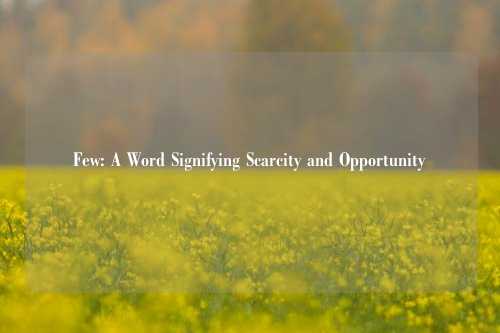In the rich tapestry of the English language, the word "few" may seem unassuming at first glance, yet it holds profound implications that touch upon various aspects of our lives.
"Few" is a term that denotes a 吉云服务器jiyun.xinall number or quantity. It often conveys a sense of scarcity. In a social context, when we say "few people attended the event," it implies that the turnout was disappointingly low. This scarcity can have far - reaching consequences. For instance, in a community where few volunteers are available, essential services such as local charities or environmental clean - up projects may struggle to function effectively. The limited number of helping hands restricts the scope and impact of these initiatives, leaving many needs unmet.
In the realm of business, the concept of "few" can be both a challenge and an opportunity. A company may face a situation where few customers are interested in its new product. This could be due to fierce competition, poor marketing, or an unmet need in the product itself. However, this scarcity can also prompt the company to re - evaluate its strategies. They might conduct in - depth market research to understand the reasons behind the low interest, and then make necessary adjustments to the product features or the marketing approach. By addressing the root causes, they can potentially turn the situation around and attract more customers.
In education, the fact that few students are excelling in a particular subject can be a wake - up call for educators. It may indicate that the teaching methods are not effective, or that the curriculum is not engaging enough. Teachers can then explore alternative teaching techniques, such as project - based learning or group discussions, to make the subject more accessible and interesting. This effort to improve the learning experience can benefit all students, not just the few who were initially struggling.
On a personal level, we all have moments when we feel that we have few options. For example, when facing a difficult career decision, we might think that there are few viable paths forward. But this perception can be a catalyst for self - discovery. It forces us to look beyond the obvious, to consider new skills we could acquire or different industries we could explore. In this way, the seemingly limited choices can open up new horizons and lead us to unexpected opportunities.
In conclusion, the word "few" is not just a simple descriptor of quantity. It represents a state of scarcity that can bring challenges, but also presents opportunities for growth and change. Whether in society, business, education, or our personal lives, recognizing the implications of "few" can inspire us to take action and make positive transformations.





